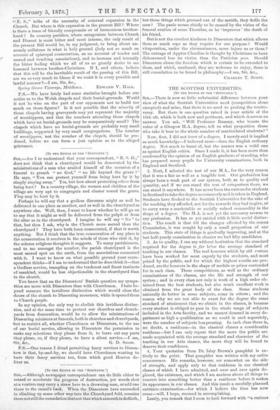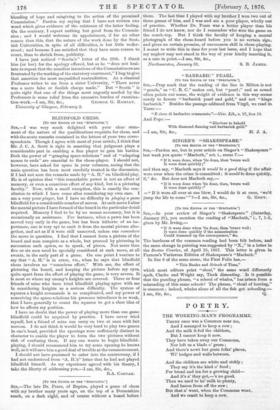THE SCOTTISH UNIVERSITIES.
[TO THE EDITOR OP THE "SPECTATOR.")
SIR,—There is now so little substantial difference between your view of what the Scottish Universities need (competition alone excepted) and mine, that there is no need to prolong the contro- versy. But there is one question raised in your article of the 15th ult. which is both new and pertinent, and which deserves an answer. You ask, "Will Professor Ramsay, who boasts the value of a Glasgow M.A. degree, tell us what proportion those who take it bear to the whole number of matticuiated students?"
Now, first, I did not boat of a degree. I merely said it implied as much knowledge—I believed more—than the English ordinary degree. Not much to boast of, but the answer was a valid one as against English critics. Since I made it, it has been more than confirmed by the opinion of an English graduate of standing, who has prepared many pupils for University examinations, both in England and Scotland.
2. Next, I selected the test of our M.A., for the very reason that it was a fair as well as a tangible test. Our graduation has always been a weak part of our system, both, as to quality and quantity, and if we can stand the test of comparison there, we can stand it anywhere. It has never been the custom for students in Scotland to take the degree as commonly as it is taken in England. Students have flocked to the Scottish Universities for the sake of the teaching they afforded, not for the rewards they had to give, or to carry away a marketable or socially valued commodity in the shape of a degree. The M.A. is not yet the necessary avenue to any profession. It has as yet carried with it little social distinc- tion. The result is that till the changes effected by the recent Commission, it was sought by only a small proportion of our students. This state of things is gradually improving, and at the last half-yearly examination in classics we had fifty candidates.
3. As to quality, I can say without hesitation that the standard required for the degree is far be!ow the average standard of teaching in our classes. The real honours which by old cnstom have been worked for most eagerly by the students, and most prized by the public, and for which the highest results are pro- duced, are the honours in the shape of medals or prizes contended for in each class. These competitions, as well as the ordinary examinations of the classes, are the life and strength of our system ; and in every class not only is work of a high order ob- tained from the best students, but also much excellent work is obtained from the great body of the class. Some students naturally do better in some subjects, some in others ; and the reason why we are not able to exact for the degree the same standard of attainment that we obtain in the classes, is because every student is obliged to pass in the whole range of subjects included in the Arts faculty, and we cannot demand in every de- partment as high a qualification as we could in each separately, were the number of subjects less pressing. In each class there is no doubt, a residuum—in the classical classes a considerable residuum—but I can only repeat that the more the public are made acquainted with the average standard and character of the teaching in our Arts classes, the more they will be found to deserve their confidence.
4. Your quotation from Dr. Islay Brown's pamphlet is en- tirely to the point. That pamphlet was written with my entire concurrence. His remarks, however, err somewhat on the side of strength, and apply only to that residuum in our classical classes of which I have admitted, and over and over again de- plored, the existence, and which I am anxious above all things to convert into something better than a residuum before it make& its appearance in our classes. And this result a carefully-planned entrance-examination—for which I believe the time has now come—will, I hope, succeed in accomplishing.
Lastly, you remark that I seem to look forward with "a curious blending of hope and misgiving to the action of the promised Commission." Pardon my saying that I have not written one word which gives evidence of the existence of the latter feeling. On the contrary, I expect nothing but good from the Commis- sion; and I would welcome its appointment, if for no other reason than this, that the nature of the work done by the Scot. tish Universities, in spite of all difficulties, is but little under- stood ; and because I am satisfied that they have more reason to court, than to shrink from, publicity.
I have just noticed " Scotia's" letter of the 29th. I thank him (or her) for the apology offered, but as he "does not hesi- tate to repeat that the manifest intentions of the Commissioners are frustrated by the working of the statutory enactment," I beg to give that assertion the most unqualified contradiction. As a classical Professor writes to me from a sister University, "There never was a more false or foolish charge made." But " Scotia " is quite right that one of the things most urgently needed by the Professors is some relief from the excessive burden of examine-
tion-work.—I am, Sir, &c., GEORGE G. RANISAY. University of Glasgow, February 2.



































 Previous page
Previous page